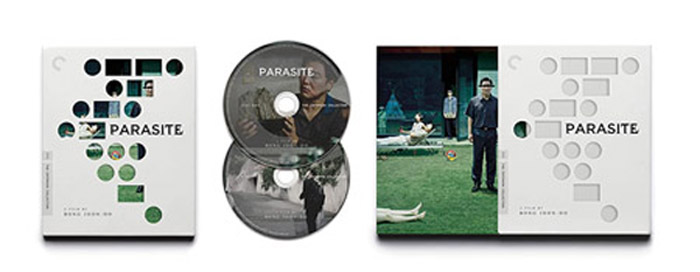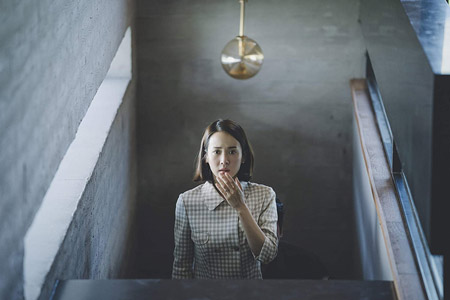
“CLASS SYSTEM SURREALISMâ€
By Raymond Benson
Throughout the history of the Academy
Awards, several foreign language (i.e., non-English) films have been nominated
for the top honor, Best Picture. The first was Jean Renoir’s Grand Illusion (1937,
released in the U.S. in 1938). Recently, Alfonso Cuarón’s Roma had a
good shot at the award in 2018. Most of the time these same pictures are also
up for the Best Foreign Language Film Oscar, and because there is usually no
chance of the title winning Best Picture, getting the Foreign Language trophy
is the consolation prize.
In 2020, however, for the movies
released in 2019, South Korea’s Parasite won Best Picture, marking the
first time ever that a non-English language movie won the award. (2011’s The
Artist, a French production, doesn’t count because it was silent.) Parasite
also picked up Oscars for director Bong Joon-ho, for its original screenplay
(by Bong Joon-ho and Han Jin-wan), and, for good measure, Foreign Language Film!
History was made that night. Oh, and earlier in 2019, Parasite was the
first South Korean film to pick up the Palme d’Or at Cannes.
That said, Parasite happens to be
undoubtedly worthy of every honor it received. It’s the type of movie that one
should hopefully know nothing about before going in because there is a surprise
at every turn. Just when you think the film is about one thing, it goes in a
different direction and becomes something else. Parasite is a surreal
black comedy that is also a horror film, a domestic drama, and an examination
of the social classes in South Korea. It’s funny as heck, as weird as any
nightmare, and aesthetically beautiful to watch. With Parasite, the
talented Bong Joon-ho (The Host, Mother, Snowpiercer)
solidified his position as one of the reigning filmmakers working today.
While the picture has been released on
Blu-ray previously, The Criterion Collection has reissued this 2-disk special
edition which not only contains a new 4K digital master of the theatrical
release (approved by Bong and director of photography Hong Kyung Pyo) with a
Dolby Atmos soundtrack, but Criterion has also included on the second disk the black-and-white
version of the picture with the same soundtrack and an introduction by
Bong.
Black-and-white version, you ask? Yes,
Bong had the desire to create a black-and-white presentation of the film
because of his love of classic black-and-white pictures by Hitchcock and others.
There is a precedent. Frank Darabont originally intended his 2007 horror flick of
Stephen King’s The Mist to be black-and-white to mimic the 1950s horror
and sci-fi fare it resembles, but the studio wouldn’t allow it. So, after the movie’s
theatrical release Darabont turned the color version into black-and-white, exhibited
the new picture in select theaters, and released it as part of the Blu-ray
package. The same has occurred here in the fabulous new Criterion offering of Parasite.
So how is Parasite in
black-and-white? For this reviewer, it doesn’t pack the punch that the color
edition does. The theatrical release is jaw-dropping gorgeous with its
vibrant color scheme. The dichotomy between the Kim family’s surroundings and
the Park’s exquisite home and the design schemes used for each is vitally
important to the themes in the picture. Go with the color edition, although for
a novelty, the black-and-white presentation is interesting enough.
If you haven’t seen Parasite,
this reviewer is loath to reveal much. Let’s just say the story concerns the
Kims, a poor family in Seoul (we presume) that lives in a tawdry basement
apartment—father (Song Kang-ho), mother (Jang Hye-jin), son (Choi Woo-shik),
and daughter (Park So-dam). However, they are deviously ambitious. The son,
Ki-woo, finagles a job as a tutor for the daughter (Jung Ji-so) of the very
wealthy Park family. The Park father (Lee Sun-kyun) and mother (Cho Yeo-jeong)
are oblivious to how privileged they are and don’t notice when the entire Kim
family infiltrates the household in other jobs (chauffeur, housekeeper, and
tutor for the young son). In other words, the Kims become the parasites of the
Parks. But wait—what lurks in the basement? Who steals food from the kitchen in
the middle of the night? What other secrets are held by each member of the two
families? You’ll have to see this twisting, turning extravaganza of bravura
filmmaking to find out.

In addition to the two excellent
presentations of the feature film, Criterion includes some exemplary
supplements. There are all new interviews with Bong, DP Hong, production
designer Lee Ha Jun, and editor Yang Jimmo. Each of these are lessons for any
filmmaking student. Especially instructive is the approximately hour-and-a-half
master class conducted by Bong from the 2019 Lumière Festival in Lyon. There’s
also a new featurette on the New Korean Cinema with Bong and director Park
Chan-wook (Oldboy, The Handmaiden), the Cannes Film Festival
press conference with Bong and the cast, a storyboard comparison, and trailers.
The essay in the booklet is by critic Inkoo Kang.
The Criterion Collection never fails to
deliver a first-class product. With a masterpiece like Parasite as its
subject, you can’t go wrong. Highly recommended.
CLICK HERE TO ORDER FROM AMAZON